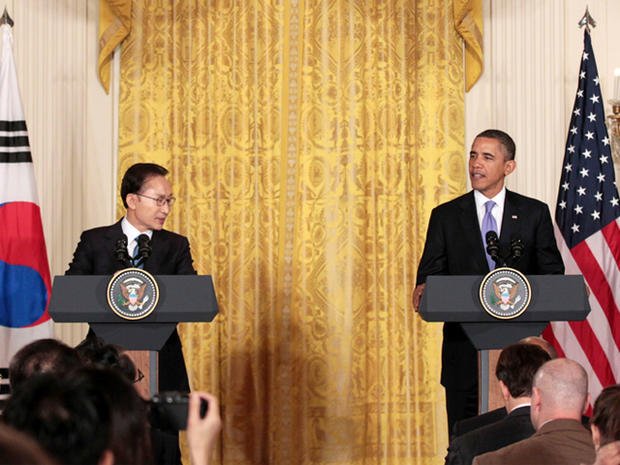Obama vows toughest sanctions yet on Iran
President Obama on Thursday vowed to impose the most significant sanctions to date on Iran for its alleged plot to have the Saudi Arabian ambassador to Washington assassinated, and expressed confidence the world would join the U.S. effort to isolate the Iranian government.
The president, speaking alongside South Korean President Lee Myung-bak in a joint press conference, said that his administration had reached out to "all of our allies, the international community, we've laid the facts before them - and we believe that after people have analyzed them, there will not be a dispute that this in fact, what happened, this is not just a dangerous escalation - this is a pattern of dangerous and reckless behavior by the Iranian government."
"This is just one example of a series of steps that they've taken to create violence and to behave in a way that you don't see other countries doing," he said. "We're going to continue to... apply the toughest sanctions and continue to mobilize the international community to make sure that Iran is further and further isolated and pays a price for this kind of behavior."
Mr. Obama predicted that Middle Eastern countries, too, will join the United States in shunning Iran, particularly in light of the plot's having targeted a Saudi Arabian ambassador.
"This is a plot that was directed against the Saudi Ambassador. And I think that what you're going to see is folks throughout the Middle East region questioning their ability to work effectively with Iran," he said. "This builds on the recognition within the region that Iran has been hypocritical when it comes to dealing with the Arab spring, given their own repressive activities and willingness to prop up the Syrian regime at a time when they were killing their own citizens."
He added: "This is a pattern of behavior that I think increasingly the international community is going to consider out of bounds and is going to continue to punish Iran for."
The administration has so far declined to say to what extent they believe the plot can be traced to the Iranian government and/or its president other than that "an individual of Iranian American descent" who was involved with the plot "had direct links was paid by and directed by individuals in the Iranian government," as Mr. Obama said on Thursday. (Others within the administration have more specifically tied the plot to senior levels of the Quds Force, a special unit in Iran's Revolutionary Guard.)
Regardless, Mr. Obama said, the plot could have resulted in civilian deaths had it been effectively carried out - and that subsequently, "even if at the highest levels there was not detailed operational knowledge [of the scheme] there has to be accountability."
The White House has repeatedly pledged to take measures against Iran for the attempted assassination, the disruption of which was revealed Tuesday night, and administration officials have reiterated the president's commitment to isolating Iran through tough sanctions and international pressure.
The Treasury Department said Wednesday it had imposed sanctions against Mahan Air, an Iranian airline that the department has accused of "secretly ferrying operatives, weapons and funds" on behalf of the Islamic Revolutionary Guard Corps. Additionally, the Justice Department has charged two men, including an Iranian-born American citizen, for allegedly conspiring with a Mexican drug cartel to kill the ambassador.
But some believe that increasing international pressure on Iran and stepping up sanctions against a handful of Iranian actors fail to send a sufficiently strong message.
Rep. Ileana Ros-Lehtinen, R-Fla., told the New York Times on Wednesday she would be sponsoring legislation that would make it more difficult for a president to waive congressionally approved sanctions even in the name of protecting American interests.
Meanwhile, former Republican presidential nominee, Sen. John McCain, R-Ariz., on Thursday accused the president of having lost a significant opportunity to spur change in U.S. relations with Iran when he chose not to side with Iranian protestors in 2008.
"We should have supported them and they could have overthrown the government then," the Arizona Republican said. "I think if we had supported the demonstrators at the time it could have meant a significant change in the government of Iran."

